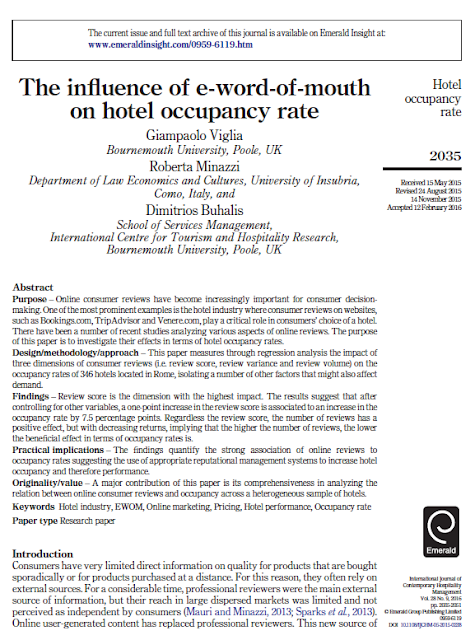New research paper
Viglia, G., Minazzi, R., Buhalis, D., (2016),”The influence of e-word-of-mouth on hotel occupancy rate”, International Journal of Contemporary Hospitality Management, Vol. 28 Iss 9 pp. 2035 – 2051 Permanent link to this document: http://dx.doi.org/10.1108/IJCHM-05-2015-0238
The influence of e-word-of-mouth on hotel occupancy rate
Giampaolo Viglia Bournemouth University, Poole, UK
Roberta Minazzi Department of Law Economics and Cultures, University of Insubria, Como, Italy, Dimitrios Buhalis Bournemouth University, Poole, UK
Abstract
Online consumer reviews have become increasingly important for consumer decisionmaking. One of the most prominent examples is the hotel industry where consumer reviews on websites, such as Bookings.com, TripAdvisor and Venere.com, play a critical role in consumers’ choice of a hotel. There have been a number of recent studies analyzing various aspects of online reviews. The purpose of this paper is to investigate their effects in terms of hotel occupancy rates. This paper measures through regression analysis the impact of three dimensions of consumer reviews (i.e. review score, review variance and review volume) on the occupancy rates of 346 hotels located in Rome, isolating a number of other factors that might also affect demand. Review score is the dimension with the highest impact. The results suggest that after controlling for other variables, a one-point increase in the review score is associated to an increase in the occupancy rate by 7.5 percentage points. Regardless the review score, the number of reviews has a positive effect, but with decreasing returns, implying that the higher the number of reviews, the lower the beneficial effect in terms of occupancy rates is. The findings quantify the strong association of online reviews to occupancy rates suggesting the use of appropriate reputational management systems to increase hotel occupancy and therefore performance. A major contribution of this paper is its comprehensiveness in analyzing the relation between online consumer reviews and occupancy across a heterogeneous sample of hotels.
Keywords Hotel industry, EWOM, Online marketing, Pricing, Hotel performance, Occupancy rate Paper type Research paper
